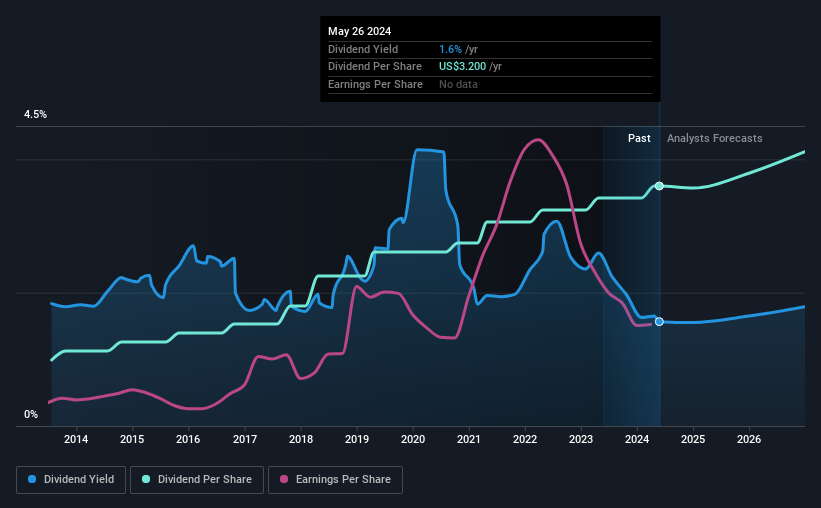Stock Analysis
- United States
- /
- Capital Markets
- /
- NYSE:EVR
Should Income Investors Look At Evercore Inc. (NYSE:EVR) Before Its Ex-Dividend?

Readers hoping to buy Evercore Inc. (NYSE:EVR) for its dividend will need to make their move shortly, as the stock is about to trade ex-dividend. The ex-dividend date occurs one day before the record date which is the day on which shareholders need to be on the company's books in order to receive a dividend. The ex-dividend date is an important date to be aware of as any purchase of the stock made on or after this date might mean a late settlement that doesn't show on the record date. Therefore, if you purchase Evercore's shares on or after the 31st of May, you won't be eligible to receive the dividend, when it is paid on the 14th of June.
The company's next dividend payment will be US$0.80 per share, and in the last 12 months, the company paid a total of US$3.20 per share. Calculating the last year's worth of payments shows that Evercore has a trailing yield of 1.6% on the current share price of US$204.42. Dividends are an important source of income to many shareholders, but the health of the business is crucial to maintaining those dividends. As a result, readers should always check whether Evercore has been able to grow its dividends, or if the dividend might be cut.
See our latest analysis for Evercore
If a company pays out more in dividends than it earned, then the dividend might become unsustainable - hardly an ideal situation. Fortunately Evercore's payout ratio is modest, at just 45% of profit.
Companies that pay out less in dividends than they earn in profits generally have more sustainable dividends. The lower the payout ratio, the more wiggle room the business has before it could be forced to cut the dividend.
Click here to see the company's payout ratio, plus analyst estimates of its future dividends.

Have Earnings And Dividends Been Growing?
Businesses with shrinking earnings are tricky from a dividend perspective. If business enters a downturn and the dividend is cut, the company could see its value fall precipitously. Evercore's earnings per share have fallen at approximately 6.4% a year over the previous five years. Such a sharp decline casts doubt on the future sustainability of the dividend.
Many investors will assess a company's dividend performance by evaluating how much the dividend payments have changed over time. Evercore has delivered 14% dividend growth per year on average over the past 10 years.
To Sum It Up
From a dividend perspective, should investors buy or avoid Evercore? Earnings per share have shrunk noticeably in recent years, although we like that the company has a low payout ratio. This could suggest a cut to the dividend may not be a major risk in the near future. It doesn't appear an outstanding opportunity, but could be worth a closer look.
If you want to look further into Evercore, it's worth knowing the risks this business faces. Our analysis shows 2 warning signs for Evercore and you should be aware of these before buying any shares.
A common investing mistake is buying the first interesting stock you see. Here you can find a full list of high-yield dividend stocks.
Valuation is complex, but we're helping make it simple.
Find out whether Evercore is potentially over or undervalued by checking out our comprehensive analysis, which includes fair value estimates, risks and warnings, dividends, insider transactions and financial health.
View the Free AnalysisHave feedback on this article? Concerned about the content? Get in touch with us directly. Alternatively, email editorial-team (at) simplywallst.com.
This article by Simply Wall St is general in nature. We provide commentary based on historical data and analyst forecasts only using an unbiased methodology and our articles are not intended to be financial advice. It does not constitute a recommendation to buy or sell any stock, and does not take account of your objectives, or your financial situation. We aim to bring you long-term focused analysis driven by fundamental data. Note that our analysis may not factor in the latest price-sensitive company announcements or qualitative material. Simply Wall St has no position in any stocks mentioned.
About NYSE:EVR
Evercore
Operates as an independent investment banking advisory firm in the United States, Europe, Latin America, and internationally.
High growth potential established dividend payer.

